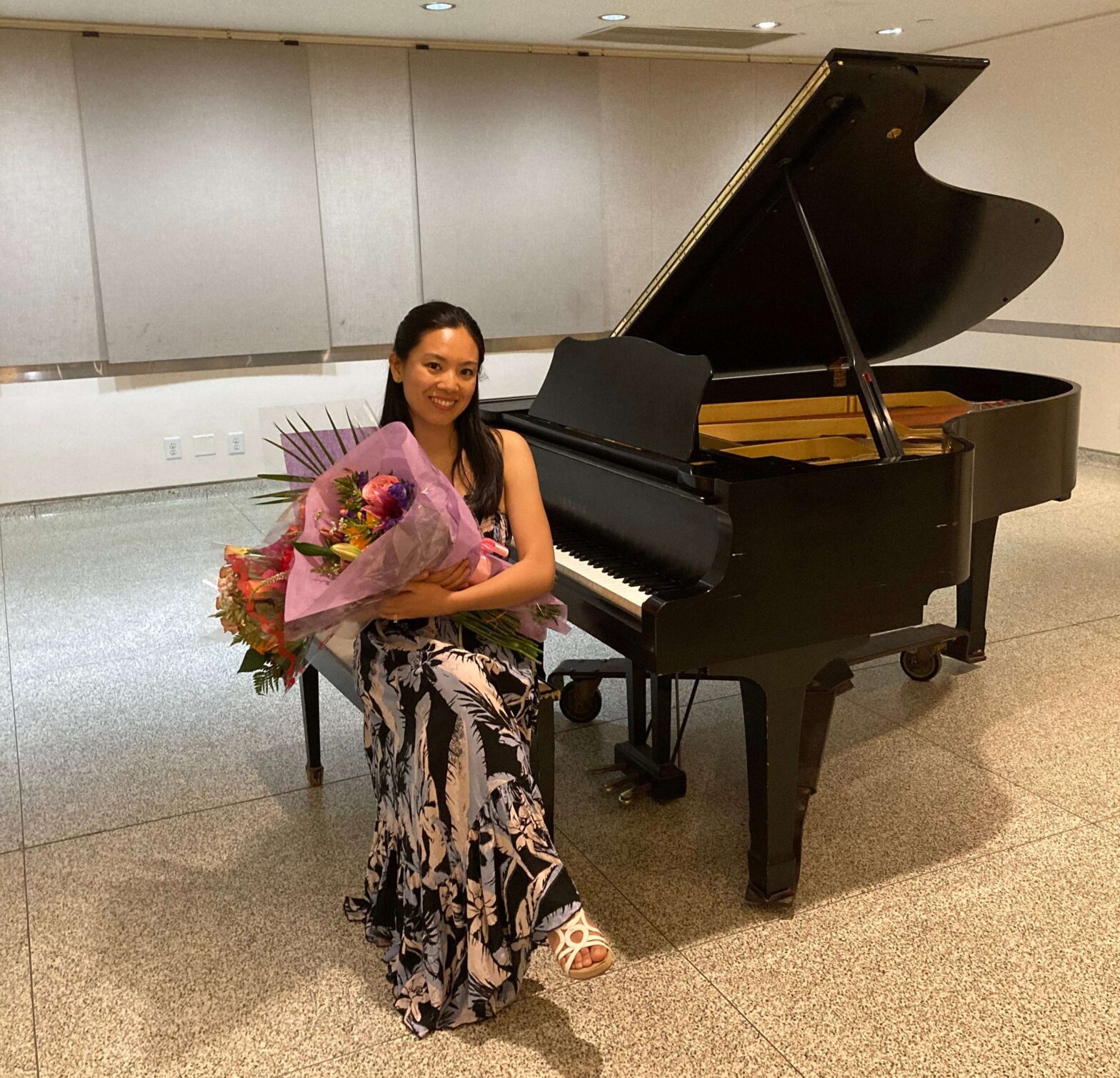Spotlighting a pianist and her journey to mastery
Originally posted by Pavel S on his substack, On Humanity, in May 2023
Welcome to Creative Humans (formerly Creative Fridays), a feature of On Humanity to engage and inspire readers to create new things and share your own creative journeys. The following text interview was conducted last month.
If you’d like to be interviewed on anything you do for inspiration — or know someone who might — please reach out by emailing info@abundance.dev!
Jennifer Chew is a product marketing leader based in New York City, where she has lived with her husband, Nick, for the past several years. She majored in history at Princeton University, and her hobbies and interests over the years have spanned piano performance, dance choreography, volunteering with non-profit organizations, and more. To unwind, she enjoys hiking, trying out new restaurants, and watching indie films.
What kind of art are you most passionate about, as a creator? As a consumer?
As a creator, I really like to work my mind and my spirit. When I pick pieces of piano music to learn, I’m attracted to pieces that introduce me to new techniques that play with texture and complex harmonic progressions. Last year I learned and performed my first piece by Prokofiev, Sonata No. 3. It’s one of the most technical pieces written for piano. I am in awe at the variety of articulation and dynamics and the evolution of the motifs swirl into a tour de force thriller kind of piece. It was very self-satisfying to perform, and I was pleased that a relatively niche composer like Prokofiev could be a hit among both my pianist and non-pianist friends who attended my performance.
I’ve also always loved playing Bach preludes and fugues. I love seeing how a motif is developed, and how melodies and countermelodies weave together to create a beautiful soundscape. It’s just stunning to study and play.
As a consumer, I’m most drawn to two types of music:
- contemplative art that explores the meaning of relationships and identity, or
- all-out celebrations of joy and life.
Sufjan Stevens and Nickel Creek are two favorite artists who fall into the first category; Lizzo and St. Lucia are two favorite artists who fall into the second category.
How did your interest in playing the piano originate?
My dad was my first piano teacher, an amateur himself, when I was 5 years old – not because I asked, but because my parents thought it would be good for my personal growth and development. I remember my parents saying that learning a musical instrument where I need to use both hands equally instead of just one would make me smarter – I’m skeptical this is scientific truth, haha.
I remember starting formal piano lessons at age 6 and feeling like this was a chore to practice for 20-30 minutes every day. I picked up new music pretty quickly though and enjoyed performing at annual recitals and school talent shows. It wasn’t until I was in middle school, however, that I was very lucky to have a piano teacher who introduced me to the soul of music, how music can represent the highest and lowest points of your life, and everything in between. I spent a summer learning and playing music among other very motivated musicians and was hooked since then.
What approaches or techniques did you use to learn the piano at an early age, and do you find them suitable for older learners? What would you do differently if you were just starting out at your current age from “ground level”? Assuming satisfactory progress in the basics, what compositions would you aim to learn first?
I used some popular beginner books, I remember them having colorful book covers and being published by Alfred’s. A lot of these pieces were just 4-8 measures long and focused on very basic touch, very basic rhythm, and learning how to switch hands and play with both hands together. When I was 6 years old and took a year to play through one or two of these books, the pacing felt right.
I do think that older learners should give themselves at minimum one year (with regular daily practice) to learn basic technique. It sounds like a long time, and perhaps this is why it’s said that it’s easier to learn new skills at a young age, when the concept of time and priorities are not challenged by the multitude of competing commitments of adulthood. But I think this 8-12 month time frame feels reasonable for being able to play simple pieces comfortably, and also having the proper technique to keep learning more intermediate pieces.
I have fond memories of learning “Mary Had a Little Lamb,” “London Bridge”, and “When the Saints Go Marching In” as some of my first pieces that I was proud of. It’s helpful to learn pieces that have a melody you’re familiar with and can sing along to, to ensure you’re playing the right notes. I also think for folks who are aiming to go beyond the basics, they should start learning some etudes by Czerny. He is hands-down the most famous classical music composer for technical instruction and technique and published hundreds of pieces for any level. His beginner works explore scales and classical rhythms – all essential building blocks.
What kinds of roadblocks have you faced in reaching a level of sophistication and mastery in learning piano? How did you overcome them?
A common roadblock I face is hearing a piece that is so beautiful, and then playing it myself, realizing I didn’t have the technique or understanding to replicate the beauty. I like to think that I have a strong musical instinct (and many of my piano teachers over time have confirmed this) and it has just taken my whole life to bring my technique up to par to express the instinct I feel inside. I suppose this is a key motivator of why I keep studying the piano today.
There’s an infinite amount of beauty I want to express, and I want the technique and skills to be able to bring that out. I remember feeling this about some of the pieces I’ve learned recently: Chopin’s Ballades, Beethoven’s Appassionata Sonata, and the Prokofiev Sonata I mentioned earlier. Growing up, I heard these on CD recordings and in recitals, and I remember knowing how amazing they sounded, but I struggled for the longest time with how to interpret the notes, how to create music rather than noise, how to develop pieces that were 8+ minutes long.
It takes a lot of focus and discipline and unending curiosity of asking myself, why does something sound a certain why, how can I emphasize it, how can I consistently play it a specific way. It also helps to find piano teachers and mentors who can break down and explain the different elements of a complex piece, whether it be form, technique, style, the composer’s intention, etc.
What outlets (projects, entities, etc.) have you channeled your creative pursuits into while you were in college? How did that change post-graduation?
When I was in college, honestly I was doing a lot of dancing – both learning and performing dance choreography, as well as choreographing my own works. I grew up studying Chinese traditional dance, ballet, jazz, and modern, and I was lucky to join the dance group Triple 8 at Princeton, which focused on Asian traditional and contemporary dance styles. I enjoyed the social aspect of being part of a dance group, and I really enjoy studying modern dance, all the ways the boundaries of movement can be pushed to create visuals and conjure emotions that may be stilted in more traditional ballet forms.
Post-college, I started getting back into piano, since I finally had an income to afford piano lessons again, and I missed the discipline of studying a very well-documented art form. I love dance as it’s always evolving and brings a certain excitement through physical movement, but due to its historic lack of written documentation, it’s ultimately a more ephemeral art form that is experienced in the moment. Studying classical piano again gave me a way to analyze and appreciate pieces I grew up listening to and could hold onto in my memory and my physical being for the rest of my life. There are pieces I hope I can play well into my elderly age and retain as forms of self-expression.
Has the pandemic affected your output and/or energy level in terms of piano performance or other artistic ventures? In what way(s)?
I started playing more piano because there was nothing else to do! The energy I would have spent going out and exploring New York City’s restaurants, museums, and art scene was funneled into practicing piano 1-2 hours a day. I have to admit that the return to normal in New York has challenged my ability to remain focused and self-disciplined on my own art. I do recognize though that honing my own art gives me the insight to appreciate and savor all of the art around me even more, so I work to strike a balance of practicing 1.5 hours about 4x per week.
Knowing that you had a long pause in piano playing between adolescence and adulthood, was it easy for you to “jump back” into it? Was there an “aha” moment that prompted your return to this passion?
It was very difficult for me to jump back in. I was initially frustrated at how much my piano technique had deteriorated during my 7-year hiatus. To give more context, I performed Chopin’s Polonaise-Fantasie during my high school senior recital. It is one of Chopin’s most difficult pieces, technically and musically, and yet it had enchanted me since middle school. I yearned to play music like that again, but soon after starting piano lessons again, I accepted that I needed to be patient with myself to recover my technique. In addition, I had to overcome my trained mindset to be competitive, to be the best, as I grew up in high-pressure education and home environments.
It took me about 3 years of resuming piano lessons in adulthood to realize that it wasn’t about being the best at this moment (and that to be honest, I would never be one of the best pianists out there), but that it’s about my personal journey to self-discovery and satisfaction of what musical gifts I personally wanted to share with my friends and loved ones.
It was also difficult knowing that as an adult, I would not be able to dedicate 3 hours/day to practice like I did in high school, so progress would also have to come more slowly. My piano teacher, Nelson Ojeda, has been such a wonderful mentor though, being able to nurture and bring out my potential despite my constraints as an adult learner. After 5 years of studying with Nelson, I am so pleased at how far I’ve come along, especially in my ability to pick up new technique so many years later. I think there has always been a part of me that has felt determined to study the pieces I have loved. It’s reassuring knowing that following this love has opened up even more music that I would have never known. I learned the first movement of Poulenc’s Piano Concerto last year and have been hooked on Poulenc since then.
Have you given any recitals or performed publicly in recent years? Would you like to share any links to these recordings with readers?
Yes, I have been performing in an annual studio recital for the past 5 years. I shared a piano recital with a fellow student last year, where I performed pieces by Bach, Chopin, and Prokofiev. I have posted some recordings that I’m particularly proud of on my YouTube channel. Here is Chopin’s Ballade No. 3.
Cover photo contributed for this post by Jennifer Chew

